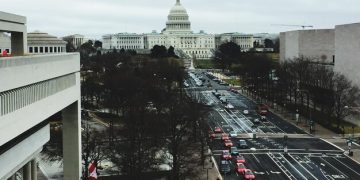Navigating Lobbying Regulations: A Compliance Guide for Political Figures

Political figures navigate lobbying regulations through compliance frameworks, disclosure requirements, and ethical standards, ensuring transparency and accountability in their interactions with lobbyists.
Understanding and adhering to lobbying regulations is critical for political figures to maintain transparency and integrity in their roles. This guide provides a practical overview of how political figures can navigate these complex rules effectively, ensuring full compliance.
Understanding the Basics of Lobbying Regulations
Lobbying regulations are designed to ensure transparency and prevent undue influence in political decision-making. These rules require lobbyists and those who interact with political figures to disclose their activities and funding.
Navigating these regulations requires a clear understanding of what constitutes lobbying and who is considered a lobbyist.
What Constitutes Lobbying?
Lobbying typically involves communicating with policymakers to influence legislation or government action. This includes direct communication, research, and strategic planning related to legislative goals.
Who is a Lobbyist?
A lobbyist is generally defined as someone who is paid to represent the interests of others by communicating with government officials. Registration as a lobbyist is often required once certain thresholds of activity or compensation are met.
- Understanding thresholds for registration.
- Identifying direct and indirect lobbying activities.
- Complying with registration requirements.
Political figures must be aware of these definitions to ensure that their interactions are compliant with the law. Lack of awareness can lead to unintentional violations and reputational damage.
Key Federal Laws Governing Lobbying
Several key federal laws govern lobbying activities in the United States. These laws establish disclosure requirements, registration rules, and ethical guidelines for lobbyists and political figures.
Understanding these laws is essential for political figures to ensure they are acting within legal and ethical boundaries.
The Lobbying Disclosure Act (LDA)
The Lobbying Disclosure Act requires lobbyists to register with Congress and disclose their clients, the issues they lobby on, and the amount of money they spend on lobbying activities. This act promotes transparency by making lobbying activities public.
The Honest Leadership and Open Government Act (HLOGA)
The Honest Leadership and Open Government Act amended the LDA and introduced stricter rules on lobbying, including disclosure of bundled contributions and restrictions on gifts and travel for members of Congress and their staff.

- Registering as a lobbyist under the LDA.
- Adhering to gift and travel restrictions.
- Disclosing lobbying activities and expenditures.
- Understanding penalties for non-compliance.
These laws provide a comprehensive framework for regulating lobbying activities at the federal level, promoting transparency, and preventing undue influence by special interests.
State-Level Lobbying Regulations
In addition to federal laws, many states have their own lobbying regulations. These regulations can vary significantly from state to state, adding complexity to the compliance landscape.
Political figures must be aware of the specific lobbying laws in their state to ensure they are in compliance.
Variations in State Laws
State lobbying laws can differ in terms of registration requirements, disclosure rules, and ethical standards. Some states have stricter regulations than others, and political figures must be familiar with these differences.
Compliance Strategies for State Regulations
To comply with state lobbying regulations, political figures should develop a thorough understanding of the laws in their state, maintain accurate records of their interactions with lobbyists, and seek legal counsel when necessary.
- Researching state lobbying laws.
- Maintaining records of lobbyist interactions.
- Seeking legal counsel on compliance matters.
Navigating state-level lobbying regulations requires diligence and a commitment to transparency and ethical conduct.
Ethical Considerations for Political Figures
Beyond legal compliance, ethical considerations play a crucial role in how political figures navigate lobbying regulations. Maintaining ethical behavior fosters public trust and ensures that decisions are made in the best interest of the public.
Ethical standards guide political figures in avoiding conflicts of interest and ensuring fairness in their interactions with lobbyists.
Avoiding Conflicts of Interest
Conflicts of interest can arise when political figures have personal or financial interests that could be influenced by their official duties. Disclosing and recusing oneself from decisions where conflicts exist is essential.
Ensuring Fair Representation
Political figures should strive to provide fair representation to all constituents, regardless of their lobbying efforts. This includes giving equal consideration to diverse viewpoints and avoiding preferential treatment based on lobbying influence.
- Disclosing potential conflicts of interest.
- Recusing oneself from biased decisions.
- Providing fair representation to all constituents.
By adhering to ethical principles, political figures can maintain public trust and ensure that their decisions are made in the best interest of the community.
Best Practices for Compliance
Implementing best practices for compliance helps political figures navigate lobbying regulations effectively and avoid potential pitfalls. These practices include maintaining transparency, seeking legal counsel, and providing training to staff.
By following these guidelines, political figures can ensure they are acting within the bounds of the law and promoting ethical conduct.
Maintaining Transparency
Transparency involves openly disclosing interactions with lobbyists, maintaining accurate records of communications, and avoiding private meetings that could raise concerns about undue influence.
Seeking Legal Counsel
Legal counsel can provide valuable guidance on lobbying regulations, helping political figures understand their obligations and avoid potential violations. Regular consultations with attorneys specializing in lobbying law are recommended.
| Key Aspect | Brief Description |
|---|---|
| 📜 Compliance Frameworks | Understanding and implementing compliance frameworks to adhere to lobbying regulations. |
| 💼 Lobbyist Interactions | Managing and documenting interactions with lobbyists to ensure transparency. |
| 📊 Disclosure Requirements | Meeting disclosure requirements to report lobbying activities and contributions. |
| ⚖️ Ethical Standards | Adhering to ethical standards to maintain public trust and avoid conflicts of interest. |
Frequently Asked Questions (FAQ)
▼
The LDA requires lobbyists to register with Congress, disclosing their clients, issues lobbied, and expenditures. It promotes transparency in lobbying activities by making this information public.
▼
HLOGA amended the LDA, introducing stricter rules on lobbying, including disclosing bundled contributions and restricting gifts and travel for members of Congress and their staff.
▼
Political figures should disclose any potential conflicts of interest and recuse themselves from decisions where conflicts exist to maintain ethical standards and public trust.
▼
Transparency helps ensure that lobbying activities are conducted ethically and that decisions are made in the public’s best interest, fostering trust in government.
▼
Penalties for non-compliance can include fines, civil penalties, and reputational damage, depending on the severity and nature of the violation.
Conclusion
Navigating lobbying regulations requires a multifaceted approach that combines legal compliance, ethical considerations, and best practices. By understanding the relevant laws, maintaining transparency, and seeking expert guidance, political figures can effectively manage their interactions with lobbyists while upholding public trust and integrity.





